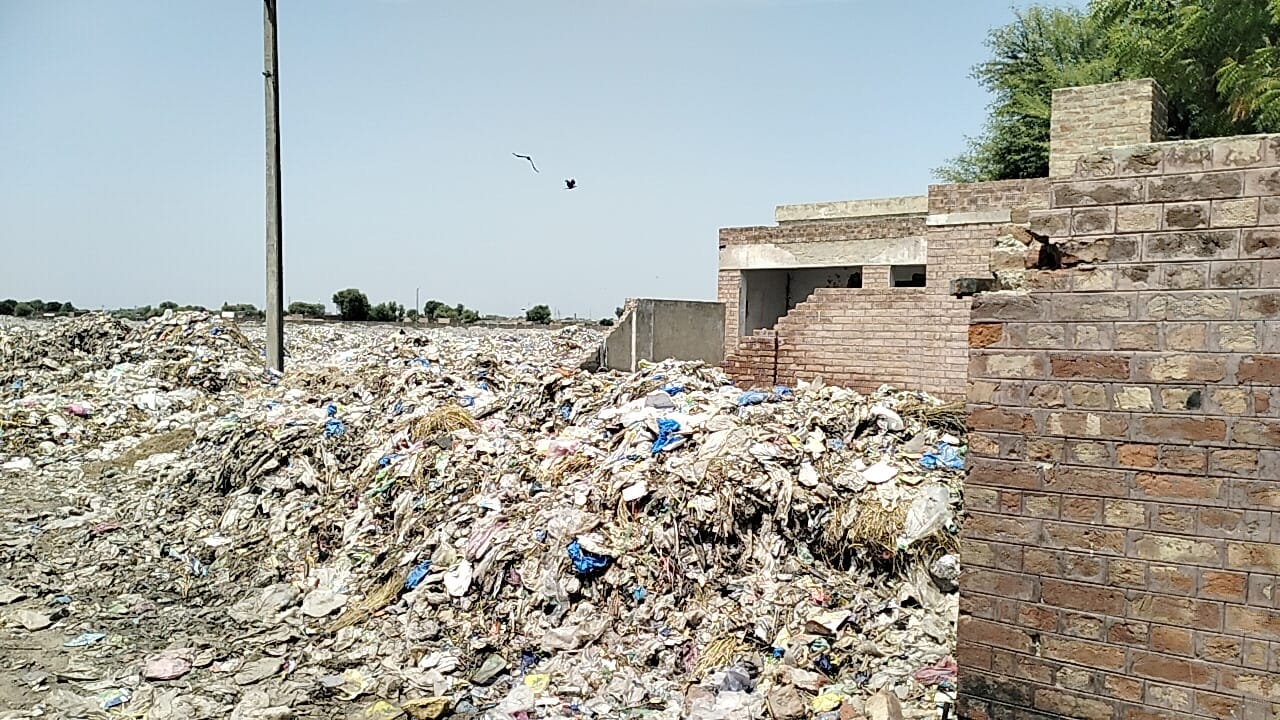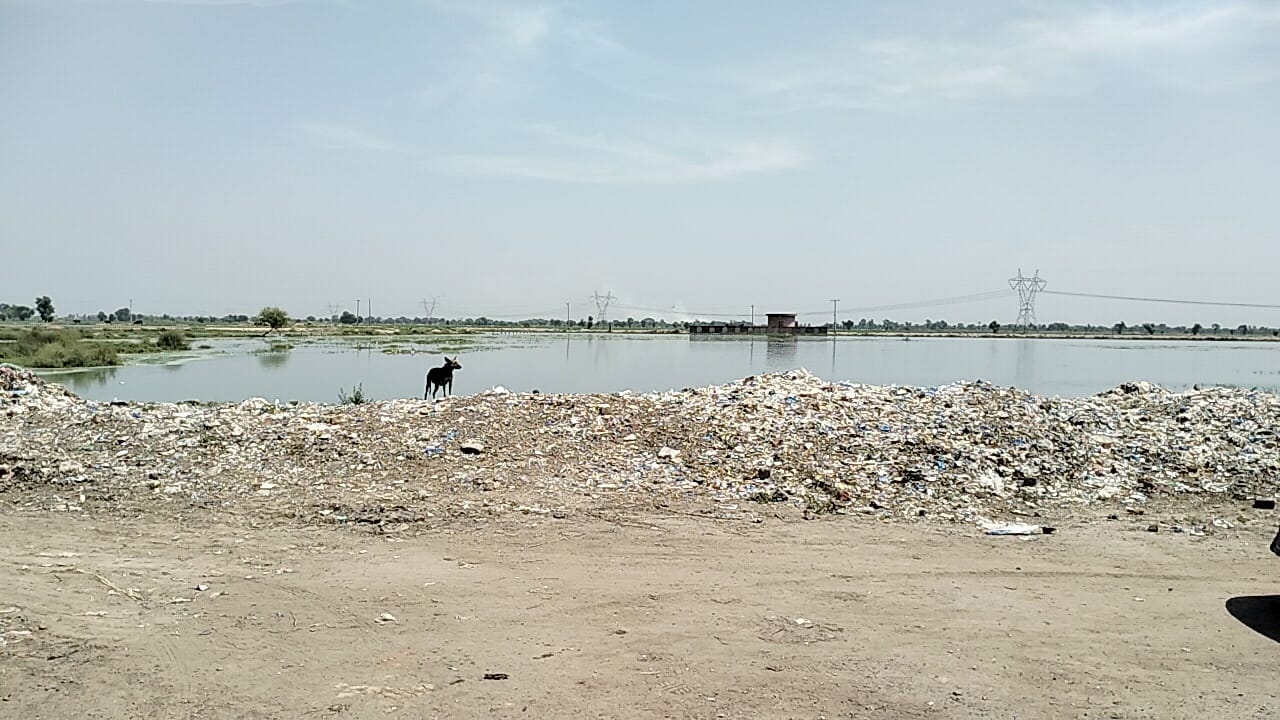Plastic Dreams: When Pollution Replaces Play in Abdullah’s World
Faisal Saleem
Khanewal: Five-year-old Abdullah lives with his parents at a brick kiln located on the outskirts of Kabirwala city. His father, Muhammad Akmal, works as a laborer at the kiln. Akmal shares that although Abdullah was born frail and weak, the strength in his legs gradually faded, and now he is completely unable to walk.
After a thorough medical examination, doctors found that the root cause of Abdullah’s condition is the area and environment in which he lives. Just near the brick kiln where the family resides is the Kabirwala Municipal Committee’s water treatment and waste disposal site.
Doctors and scientific research point out that people living near plastic manufacturing industries or waste disposal sites often face issues such as low birth weight in newborns, asthma, lung cancer, and other serious health conditions.
A visit to the Budhwana waste and water disposal site and similar areas reveals heaps of garbage and stagnant, polluted ponds of water. The stench is so strong that one cannot stay nearby for long. Crows and other birds are often seen feeding on these piles of filth.
One of the most prominent waste materials at these disposal sites is the plastic shopping bag, which contributes to over 11 percent of Pakistan’s environmental pollution.
According to the Environmental Protection Department, about 55 billion plastic bags were produced in Pakistan in 2019, with a 15 percent annual increase. Based on this trend, the number has now reached 126 billion. These bags are used for an average of only 12 minutes, and their decomposition is nearly impossible.
While the Punjab government appears to be serious about waste management, past restrictions, advocacy by civil society, and institutional fines have largely failed to curb plastic bag production.
Under the “Clean Punjab” campaign, the government has outsourced cleanliness to private firms, expanding their operations from urban centers to rural neighborhoods.
Villages Struggle With Waste
According to Muhammad Usman, District Incharge of the Multan Waste Management Company (MWMC), waste is now being collected from urban areas and 647 villages in Khanewal district through sub-offices at the tehsil level.
An average of 365 tons of waste is collected daily from Kabirwala, 355 tons from Khanewal, 327 tons from Mian Channu, and 196 tons from Jahanian. A cleaning staff of 1,279 in Kabirwala, 1,096 in Khanewal, 973 in Mian Channu, and 646 in Jahanian is responsible for this task. Every four feet of collected garbage is covered with a layer of soil at disposal sites to prevent environmental hazards. Usman states that while some complaints are still received, the system is functional and ensures staff attendance and performance.
Every four feet of collected garbage is covered with a layer of soil at disposal sites to prevent environmental hazards. Usman states that while some complaints are still received, the system is functional and ensures staff attendance and performance.
However, he adds that a complete cleanup may take another year, after which regular cleanliness will reduce pollution levels.
The Environment Protection Agency also suggests that once a landfill site is full, the gases emitted can be harnessed, the area can be greened with plantations, and the space turned environmentally friendly. A similar model was piloted in Lahore and is intended to be implemented across Punjab.
However, no data was available from Khanewal’s Environmental Protection Department regarding actions or fines to reduce plastic pollution.
UNICEF-Backed Ban Fails
According to UNICEF, in 2019, Pakistan joined the 128 countries that banned the production, sale, and use of polyethylene bags and encouraged the use of “oxo-biodegradable” alternatives. However, this policy remains poorly implemented.
Muhammad Aziz, owner of Tawakkal Plastic Center, says he only sells high-quality plastic bags. But since there is consistent market demand, completely stopping the sale or use of these bags seems nearly impossible. He believes public awareness is crucial to reduce plastic bag use.
“Plastic bags were introduced as a substitute for paper bags to reduce deforestation, but they turned out to be even more dangerous for the environment,” says Dr. Akhtar Hussain, District Manager at the NGO World.
Pakistan Commits To SDGs
Pakistan not only recognized the United Nations Sustainable Development Goals but also integrated them into its national development strategies. In particular, Goal 12 (Responsible Consumption and Production) and Goal 13 (Climate Action) are being monitored under the 2022 SDGs Framework.
Pakistan also supported a 2022 UN Environment Assembly resolution to develop a global legal agreement by 2024 to end plastic pollution.

Additionally, the Ministry of Climate Change, in collaboration with the UN Environment Programme, launched the Plastic Waste Management Action Plan 2020–25, which includes reducing plastic use, promoting recycling, implementing Extended Producer Responsibility (EPR), and enhancing legislation and awareness.
Despite all these promises and policy documents, practical implementation remains lacking. Low-quality plastic bags continue to flood markets, with little evidence of effective bans or controls. This disconnect reflects a stark contrast between Pakistan’s international commitments and domestic reality.
Hope Fades For Abdullah
Back to our central character, Abdullah’s father Akmal remains hopeless about his son’s treatment. Still, he earnestly appeals to policymakers and relevant institutions that he cannot afford to relocate. But if the authorities perform their duties diligently, these disposal sites will no longer pose such grave risks. And maybe then, no other child will face a disability like Abdullah’s.
The case of young Abdullah not only represents a personal tragedy but also raises serious concerns about violations of basic human rights.
According to Pakistan’s Constitution (Article 38), state ensures the promotion of social and economic well-being of the people, while international treaties like the UN Convention on the Rights of the Child emphasize the child’s right to a healthy environment and adequate standard of living.
Yet, children living near such hazardous waste sites are routinely denied these rights, making it imperative for state institutions to align their environmental policies with both constitutional mandates and international commitments.
“Abdullah’s family declined to have his photo taken due to his physical condition and the psychological impact; therefore, his images have not been included in the story.”
Faisal Salim is a Khanewal-based freelance journalist and development expert.

Comments are closed.